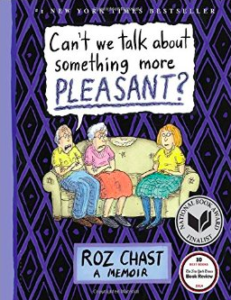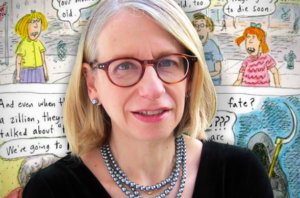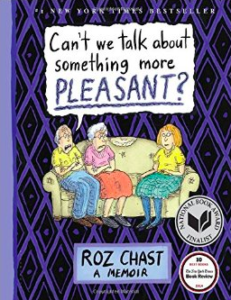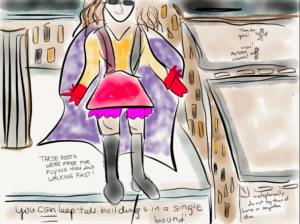Writers Read: Can’t We Talk About Something More Pleasant? by Roz Chast
 The great thing about graphic memoirs is that they tell a story with pictures and somehow capture a feeling or an expression that no words can explain. It’s tricky, though. Because the association that a graphic novel is a story of cartoons, the expectation is that the subject matter is fiction. With a graphic memoir, the shock of the serious content juxtaposed with cartoonish characters can be unsettling. Roz Chast’s colorful graphic memoir, Can’t We Talk About Something More Pleasant?, is the illustration of her parents as they approach the final stage of their lives and the challenges an adult child in this culture is often faced with: what do I do with these frail, delicate, beloved humans who don’t always remember me, who can’t take care of themselves, who stubbornly refuse to change socks, and who I love more than anything?
The great thing about graphic memoirs is that they tell a story with pictures and somehow capture a feeling or an expression that no words can explain. It’s tricky, though. Because the association that a graphic novel is a story of cartoons, the expectation is that the subject matter is fiction. With a graphic memoir, the shock of the serious content juxtaposed with cartoonish characters can be unsettling. Roz Chast’s colorful graphic memoir, Can’t We Talk About Something More Pleasant?, is the illustration of her parents as they approach the final stage of their lives and the challenges an adult child in this culture is often faced with: what do I do with these frail, delicate, beloved humans who don’t always remember me, who can’t take care of themselves, who stubbornly refuse to change socks, and who I love more than anything?
What do I do with these frail, delicate, beloved humans who don’t always remember me, who can’t take care of themselves, who stubbornly refuse to change socks, and who I love more than anything?
Chast mixes up the memoir with copies of handwritten poems from her mother:
“When an unexpected illness struckdown [sic] the invincible.”
A random meteor
Shattered my world from above
Disrupting the lives
Of those whom I love
My husband, my daughter
Are caught in the swirling storm’s wake
But I shall over come this
For all of our sake…. (67)

Roz Chast, author of Can’t We Talk About Something More Pleasant? (Photo credit: Bill Franzen/Salon)
She includes actual photos of her parents’ apartment, rooms with desks piled high with files and folders and books and purses and clothes—evidence that the dreaded, “I might want this later,” or worse, the decision that creates all clutter, “What should I do with this?” have now caught up with them. Anyone who has ever had to help an older person begin to sift through their life has probably encountered similar collections, big and small, of things that make no sense. Why would you keep a band-aid box from 1962? How come the same bag of shoes that need resoling is still in the hallway and hasn’t moved since the last time I was here? And God forbid, what about the Hummel collection? Looking at the physical proof of her parents’ existence, alongside frank words of someone whose disbelief is both amused and sad, a wave of nostalgia settles over the pages.
Chast places the reader in the real time of her parent’s slow (or fast, depending on how you are feeling) decline. When they are moved to an independent living retirement home, she puts the description of the facility in text, in a “frame” set against the gray and pink wallpaper of the “activities room.” Below the text, there is an image of an old woman doing a jigsaw puzzle with a suspicious scowl on her face as she sizes up the facility’s newcomers.
It’s a strange sensation to be letting go and feeling sad when it isn’t even someone you know—but again, that’s the power of a graphic text.
The tone of the book remains steady as the images and text convey Chast’s emotions. We readers begin to accept the eventual death of her parents at the same time Chast does. It’s a strange sensation to be letting go and feeling sad, when it isn’t even someone you know—but again, that’s the power of a graphic text. The last pages of the memoir are still-life drawings of Chast’s mother as as she sleeps in the final hours before she passes. At this point in the memoir, the color and cartoon images switch over to pen and ink to capture Chast’s mother’s return to innocence, as she slowly slips away and the one watching the transition begins to mourn the finality of death.
Chast, Roz. Can’t We Talk About Something More Pleasant? New York: Bloomsbury, 2014. Print.






